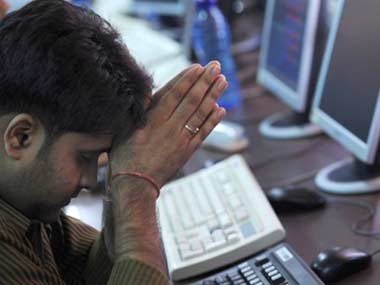ICICI Bank has been quite the newsmaker over the past 48 hours.
[caption id=“attachment_155687” align=“alignright” width=“380” caption=“Praying for reform? Reuters”]
 [/caption]
[/caption]
On Tuesday, a Bloomberg report said that the cost of protecting the bonds of Indian banks against default were rising at the fastest pace among Asian lenders, led by ICICI Bank, the country’s largest private-sector lender.
According to the news agency, credit default swaps jumped 76 basis points in the past month to 471 basis points, the biggest advance in the region. That indicates investors are getting worried about the perceived risk of default.
A CDS is a financial contract used by creditors to insure themselves against the risk of non-payment.
The buyer of a credit swap receives credit protection, while seller of swap guarantees credit worthiness of the product.
In the event of a default, the buyer of the CDS receives typically the face value of the loan, while the seller of the CDS takes on the defaulted loan (and with it the right to recover the loan at some time later).
Higher the CDS rate, higher is the risk of default. Traders use the CDS market to speculate on credit quality.
Fears of worsening quality of its assets and tightening liquidity conditions in the financial system (about Rs 50,oo0 crore is expected to flow out as advance tax payments by tomorrow) are primarily behind investors taking fright in the financial markets.
Yesterday, ICICI Bank’s shares tumbled to a 27-month low of Rs 690.25. The stock is currently trading at Rs 710.
While liquidity conditions are the immediate concern, what’s happening to ICICI Bank in the financial markets also reflects the fears that investors have over the broader economy.
State of economy partly to blame
High interest rates, a plunging rupee, contracting industrial output and cooling consumer demand are weighing on companies - and banks that have lent to them. The biggest fear among investors is that bad debts and loan restructuring will rise at Indian private- and public-sector banks, crimping profitability.
Those fears are justified because wherever you look, you can see sectors in pain.Small and medium enterprises, iron and steel, textiles, mining, power, aviation companies - all of them are wheezing under the heavy load of debt, high borrowing costs and/or regulatory problems.
Indeed, most brokerages expect the bad loan level at Indian banks to rise. Credit demand has already slumped to 17.7 percent from 21 percent in March.
It would be easy to blame these problems on high interest rates, or even inflation, but really, those are not the only issues.
A recent Standard Chartered report noted that a rate reversal - which India Inc is feverishly praying for - is unlikely to mean the end of all of the banking sector’s problems. “….a large portion of the corporate stress is on account of a lack of clarity on government policy, not higher rates. As such, rate reversal may not sort out all asset quality issues though it will help asset quality of small and medium enterprises and retail,” it said.
Rate cut: Not the answer
What could really fire up the banking sector are - no prizes for guessing - reforms across sectors.
For instance, political consensus on state electricity boards, most of which are bleeding money, and changes in policy on private power generation projects could be a big trigger for bank stocks, because power ranks among the sectors most likely to increase bad loans at banks.
In fact, ICICI Bank leads the list of banks with the highest loans to this problem-ridden sector, according to The Economic Times .
Banks like ICICI Bank and SBI also have exposure to the troubled aviation sector, and you only have to look at Kingfisher Airlines (which can’t even pay staff salaries, according to media reports) to know how badly things can turn out for banks.
ICICI Bank’s exposure is not very high – about Rs 400 crore or so – but given the sluggish economic environment, that’s exposure it could have done without.
In addition, “lack of policy clarity on key sectors - mining/iron and steel, telecom, power will remain key risks for loan growth and asset quality,” the Standard Chartered report said.
A lack of clarity on key sectors and a slumping economy will give rise to more problem cases like 3i Infotech, an IT company that is teetering on the brink of default after the yield on itsforeign currency convertible bonds surged to over 40 percent from 24.5 percent, according to The Economic Times . 3i infotech, incidentally, is an ICICI group company.
“A debt-driven acquisition binge has come back to haunt the company causing a severe cash crunch, repelling investors and lenders and raising the prospect of either a distress sale or cutback in operations,” the newspaper noted.
That’s not all: another factor affecting profitability is the deregulation of the deposit savings rate. So far, only smaller banks in pursuit of a larger base of retail customers have raised deposit rates. But if larger banks follow, their profitability will also come under pressure (their costs of funds increase, while demand for credit remains muted).
Despite all this, many brokerages remain more positive on private-sector banks than public-sector banks. Standard Chartered issued a ‘buy’ rating on ICICI Bank last month, while HSBC maintained an ‘overweight’ rating, following the bank’s September-ending quarter results. Credit Suisse said it was ’neutral’ on the stock, while Bank of America Merill Lynch rated it a ‘buy’.
But given the tough road that lies ahead, is it any wonder that investors are getting the jitters?
)